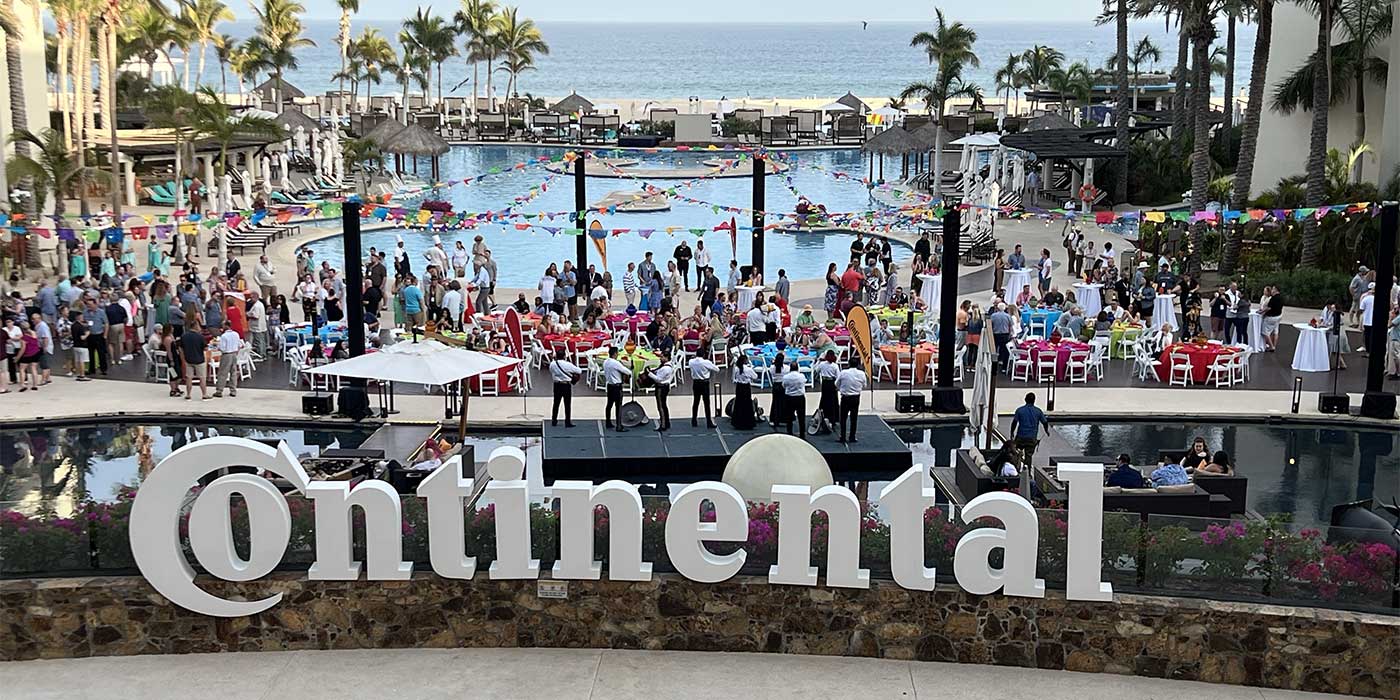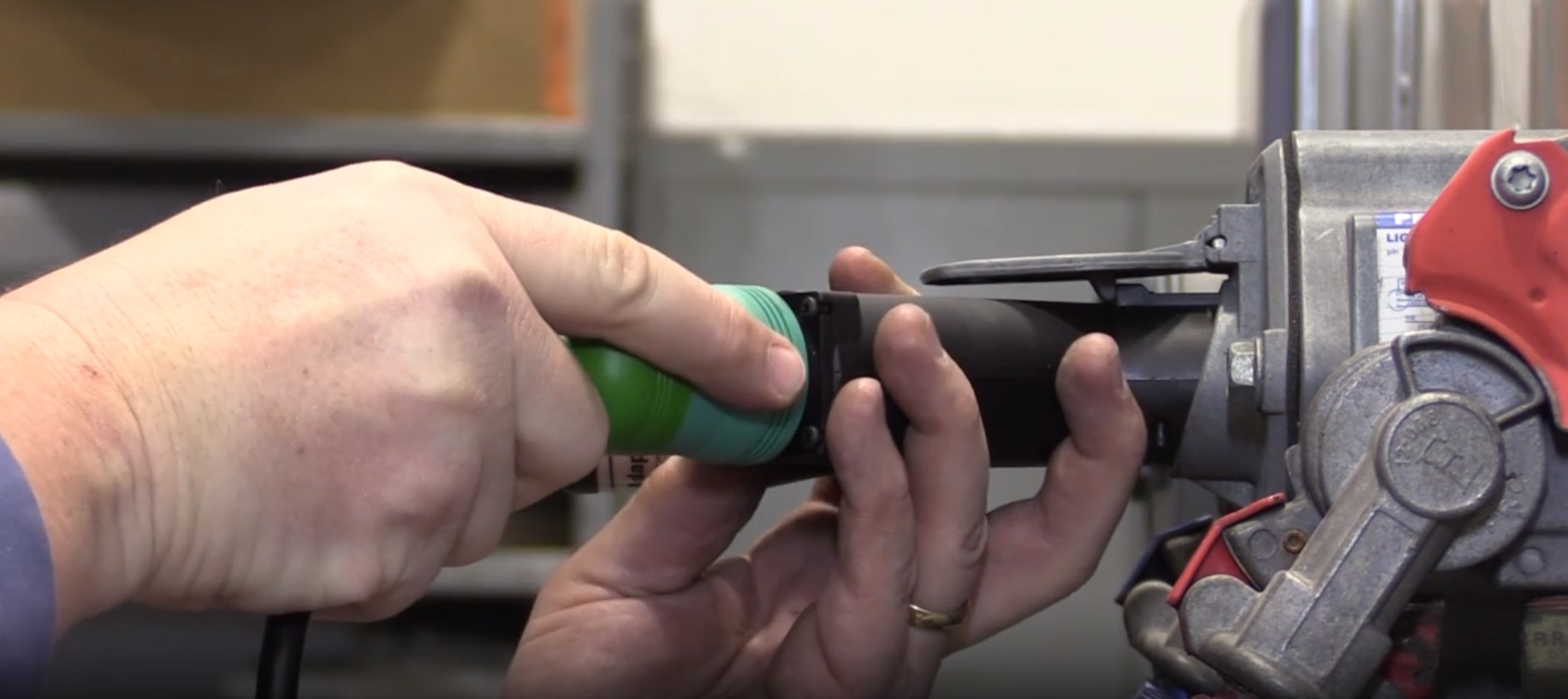What is not so clear, however, is if there is a good market for engine builders graduating from schools into shops. Most people in the industry know that sport compact guys usually start out with body kits, wheels and other “styling” accessories before making any internal engine modifications.
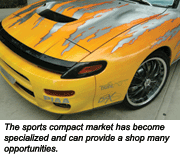 The Specialty Equipment Marketing Association (SEMA) says the market has seen strong growth with more than 50% increases year after year, yet last year was termed by many as an off year. Hundreds of manufacturers have jumped in to get a piece of the action, but tuner enthusiasts are a fickle bunch and often snub high profile marketing for the smaller, less well-known brands.
The Specialty Equipment Marketing Association (SEMA) says the market has seen strong growth with more than 50% increases year after year, yet last year was termed by many as an off year. Hundreds of manufacturers have jumped in to get a piece of the action, but tuner enthusiasts are a fickle bunch and often snub high profile marketing for the smaller, less well-known brands.
Young engine builders who wish to be part of this maturing market will need to make a commitment to appeal to this group of potential customers by playing in the same arenas. This is not a market in which an engine shop can sit on the sidelines and hope to get business. Someone at the shop will have to go out and actively pursue this niche and that person could be you. Car shows and midnight drag races are part of the culture for these customers and the more you put yourself in front of them, the better chance you will have of landing their business.
Tuning Into Customers
What most tuner customers are looking for is customization – the pieces and parts that make their car different from the crowd. This may lead to opportunities for engine builders to help the tuner enthusiast personalize his or her engine for that one-of-a-kind vehicle no one else has.
After talking to several engine builders from different parts of the country, it is clear that this is a very specialized market. Many of the shops who have had strong business in domestic V8s and even production engine work are not seeing much sport compact work come through the doors. Part of this can be attributed to the fact that they don’t pursue it, but small shops that specialize in only sport compact engines seem to be doing the majority of the work.
One such company based out of Macon, GA, specializes in only sport compact. Cool Cat Racing (www.coolcatracing.com) saw an opportunity to service road racers and autocross racers in their area and has steadily grown in the two years since they opened.
“We recently built an R33 Nissan Skyline GTR engine,” says Cool Cat Racing’s Ryan Reynolds. The Nissan Skyline is one of the vehicles that gives tuners chills. It is only sold in Japan and has a long racing heritage there. It is one of the cars that started the drifting scene in Japan. Drifting has now come to the U.S. in a big way, with manufacturers such as GM and Ford trying to get in on the action as well as the Japanese manufacturers. It’s been touted as the next big thing in racing, and involves sliding a rear wheel drive car around a course in a stylish manner where speed is not the point – it’s style that counts most.
“We actually have 3 Nissan GTRs,” says Reynolds. “The GTR we worked on was a daily driver and we built it as a car to take to shows. And we’re building another GTR into a road race car. It was a hillclimb car that ran at Pike’s Peak and set the stock class record in 1996.”
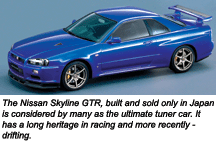 Cool Cat Racing, like others that specialize in this market segment, builds more than just engines. However, performance is the main focus for them. “We bought a Tomei stroker kit with fully forged internals for the GTR,” explains Reynolds. “The turbos we’re going to run will make 700 hp at the wheels. The engine will be capable of a lot more, though. It started out as a 2.6L inline 6-cylinder powerplant – with the stroker kit it will bump it up to 2.8L.”
Cool Cat Racing, like others that specialize in this market segment, builds more than just engines. However, performance is the main focus for them. “We bought a Tomei stroker kit with fully forged internals for the GTR,” explains Reynolds. “The turbos we’re going to run will make 700 hp at the wheels. The engine will be capable of a lot more, though. It started out as a 2.6L inline 6-cylinder powerplant – with the stroker kit it will bump it up to 2.8L.”
Tomei is a Japanese supplier, but what is unusual about their inventory, according to Reynolds, is that most of the parts it supplies are made in the U.S. The stroker kit he purchased from Tomei included Carrillo rods, JE pistons and an Eagle crank. “Every bit of it is American stuff,” says Reynolds. “But because of the non-competition agreements with Japan, we have to buy these American parts for the Skyline through Tomei. So they import it to Japan and then we pay to have it shipped back over here.”
Making the Sports Scene
Other shops that don’t exactly specialize in sport compact have seen increases in business in the last few years also. “Sport compacts have become a bigger part of my business in recent years,” says Import Machine’s Dana Johnson. “Most of the increase for me has been in tuning Miata engines for road racing and autocross. But I also get some Toyota engines because there are people in the area (near Boston) who are, for some reason, really into hot rodding their Toyotas. They add anything you can think of to make power – turbos, superchargers and mostly the bottle (nitrous oxide).”
Johnson says that one of the appealing things about sport compact engines is that the bottom end is typically very durable. “You can really lean on the bottom end of these engines because they’re usually very rigid,” he explains. “These engines will usually have problems with the cylinder head before the bottom end falls out.”
Earlier this year, Johnson was working on a 1956 VW Beetle project. He hopes to make it a 10-second car with a 2300cc engine with big, high flow heads and big carbs. He says if it won’t run 10s naturally aspirated, he’ll add a bottle.
“We build quite a few non-VTEC B18s just because they’re easier to find and less expensive than the VTEC,” says CCR’s Reynolds. “Most of the ones we build are for a Civic application. Many people will buy a cheap Civic and put an Integra engine in it later. It’s no different than what car guys have been doing since the ’50s – you put the biggest engine you can into the smallest hole.”
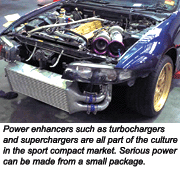 Mixing Tuners and Muscle
Mixing Tuners and Muscle
Norm Brandes of Westech Auto in Silver Lake, WI, sees the tuner market a little differently. He is involved in many domestic performance projects, but says that sport compact has become part of the mix for his business. “I’ve got a VW Corrado and a Honda in here right now,” says Brandes. “The Corrado was supercharge from the factory, but we made it a turbo. The Honda is a 1994 Prelude that was first built by another shop for our customer as a 2.3L VTEC, and then we added cams, cylinder head, header, Motec ECU and changed the compression ratio.”
Brandes says the VW work he is doing is estimated to be around $20,000 and the Honda will be around $35,000. This is a high price tag for the typical tuner enthusiast who may only spend the bare minimum to put the engine together, adding bolt-on parts later. “One of the customers is a pilot and the other is a bank vice president, so they aren’t who you typically think of being involved in the tuner market,” says Brandes.
“While I think the days of the glitzy lights and appearance accessories aren’t necessarily over, it’s not what I’m looking for,” says Brandes. “The engines I’m building will produce serious musclecar performance, but with power enhancers. For both of these particular customers, the cars were among their first, and they wanted to keep them going. It’s not that they don’t like V8s, it’s just that they simply like the 4-cylinder stuff. With the Honda for instance, we are remapping the ECU, stroking the crank and we’ll add a turbo also. Normally aspirated, the engine is rated at 275 hp, but with the upgrades it’ll be in the 400-450 hp range.”
According to Brandes and others, last year was a bit of an off year for sport compact. Experts say it is typical of a market segment that is maturing to have some downturns here and there. “What I think is happening to the market is that we’re seeing you can only put on so many neon lights and airdams and such. But, that being said, there are people who still really like sport compacts and want their car to be unique,” says Brandes.
The West Coast has been seen as a haven for sport compact vehicles and it is where the whole market began in the mid ’80s. However, not all shops in California are seeing this work as a result. “We do very little sport compact work,” says Mark Godfrey of Wayne’s Engine Rebuilders & Auto Parts, Riverside, CA. “I see the cars buzzing around everywhere and I know there are shops that do this work, but it’s mostly specialists that no one but those who are insiders know about. I don’t know any shops personally that do this work around us, and our warehouse sells to 400 engine builders and parts stores in the area. But many guys in this market are buying direct, too. So the numbers are somewhat misleading.”
Young engine builders wishing to get involved in the sport compact market may find many opportunities to specialize. They also can be very profitable for a shop. The best advice for those who are willing to make a go at this market segment is to share a deep interest in compact cars, learn to speak the tuner language and, if possible, live the tuner lifestyle.

